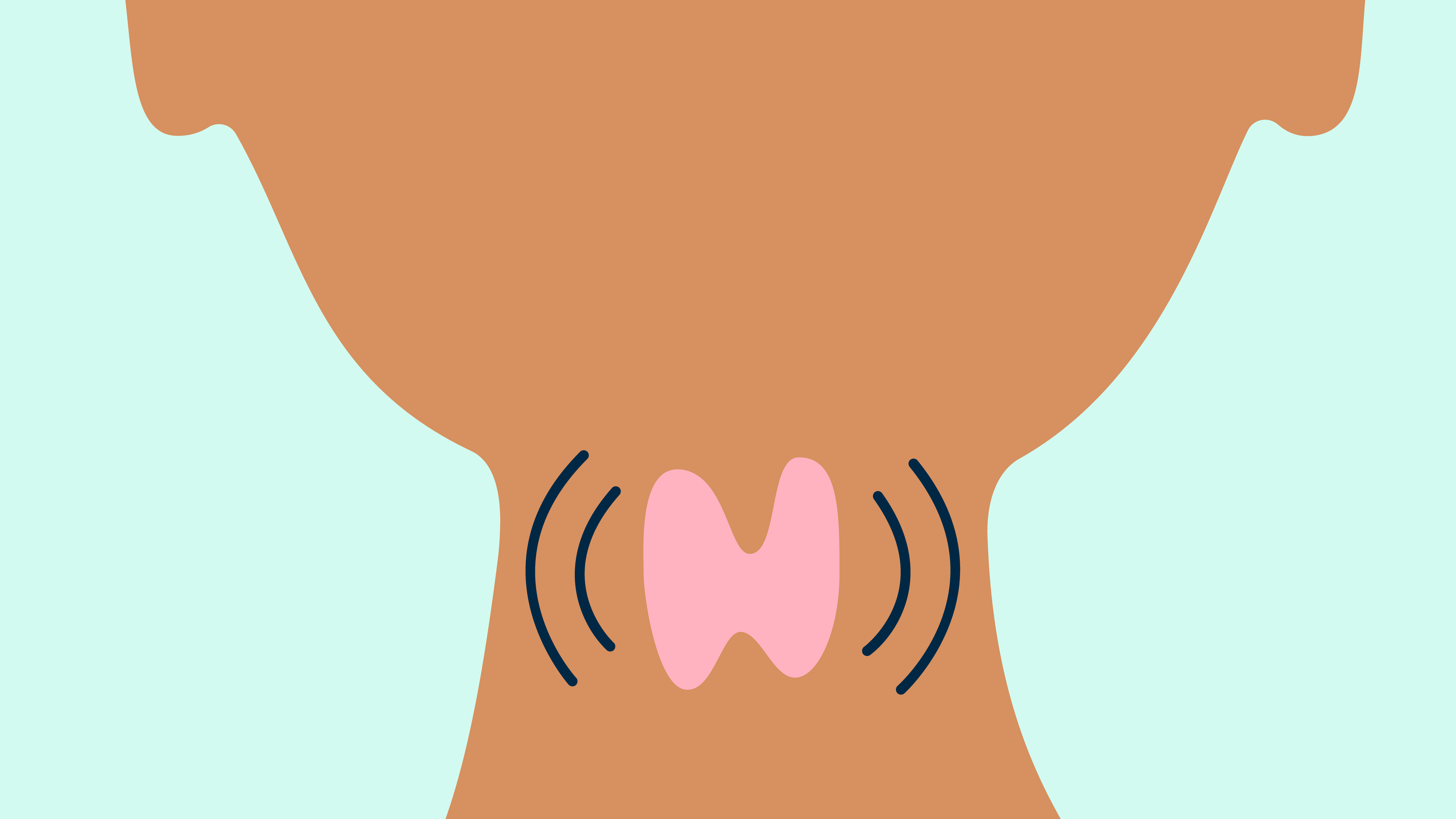There are some common conditions that could have a number of causes, for example depression, tiredness or unexplained weight gain. But when they also come with other symptoms like constipation or sensitivity to cold, they may signal a thyroid problem.
It’s estimated that 200 million people worldwide have some form of thyroid problem. The two most common thyroid disorders are hypothyroidism (underactive thyroid) and hyperthyroidism (overactive thyroid) with women 10 times more likely to be affected than men.
What is the thyroid gland?
The thyroid gland has a small, butterfly shape and is located in the front of the neck, just below the larynx. It produces two hormones, thyroxine (T4) and triiodothyronine (T3). Two areas of the brain, the hypothalamus and the pituitary gland, control the hormone balance in the blood and the amount of thyroid hormones to be produced and secreted.
Thyroid hormones regulate energy, metabolism, body temperature, body weight, muscle strength, appetite, breathing, growth, the reproductive system and also heart, brain and kidney function. When your thyroid is functioning well and producing the right amount of hormones, everything runs smoothly.
Lifestyle factors are important if you want to keep your thyroid healthy. Eating a nutritious, balanced diet, getting enough sleep, exercising regularly, managing stress levels and a healthy immune system all go a long way to keeping your thyroid in balance.
What can go wrong with the thyroid?
There are different types of thyroid disorders, including:
- Goitre – enlarged thyroid, most commonly caused by low levels of the mineral iodine
- Graves’ disease – an autoimmune disease that causes hyperthyroidism
- Hashimoto’s disease – an autoimmune disease that cause hypothyroidism
- Thyroid nodules – 90% of these are usually benign
- Thyroid cancer – although this is a rare type of cancer
The two most common disorders are hypothyroidism and hyperthyroidism – so let’s look at some of their common symptoms.
Because these symptoms could be down to many other reasons, we’ve also listed some other potential common causes that your doctor may ask you about — along with other thyroid symptoms to look out for too, also below.
Symptoms of hypothyroidism (underactive thyroid gland)
This is where the thyroid gland does not produce enough thyroxine (T4) and triiodothyronine (T3). As hormone levels fall, the thyroid-stimulating hormone (TSH) rises. The result is that you can feel tired, cold and depressed. It’s more common for women to get thyroid problems like this, especially around menopause, but hypothyroidism occurs at all ages. Common symptoms include:
- Tiredness
When thyroid hormones drop, your body processes slow down. Your metabolism and heart rate become slower, blood circulation becomes more sluggish and energy levels go down. This can leave you feeling exhausted.
Other causes of tiredness Stress, lack of sleep, post-viral fatigue, overworking, psychological factors, food intolerances and nutritional deficiencies, including iron deficiency anaemia, can all lead to tiredness. If you’re concerned, always talk to your doctor, who can test for other problems such as low iron levels.
- Weight gain
When the thyroid is not producing enough hormones, it can lead to a low basal metabolic rate (BMR). When your metabolism is slowed down, this means you’re not burning energy (calories) as efficiently, so weight goes on more easily. Weight gain and bloating can also occur due to fluid retention.
Other reasons for weight gain Underactive thyroid weight gain is nearly always accompanied by other symptoms. But if weight gain is your only symptom, it could be that you’re overeating, not exercising enough or you’re producing too much of the hormone cortisol due to stress and this is causing you to accumulate fat, particularly around the abdomen. It’s still worth talking to a doctor about this.
- Depression
Thyroid hormones play an important role in maintaining healthy brain function. When they are low, depression may result. For example, thyroid hormones help to regulate the hypothalamic-pituitary-thyroid axis, involved in the regulation of emotions, moods and behaviours. Depression induced by an underactive thyroid can be reversed with hypothyroid treatment.
Other causes of depression Lack of sleep, poor diet, lack of natural light, stress, feeling powerless, upsetting life events (like a bereavement, losing your job, or a relationship break-up), physical, sexual or emotional abuse, low self-esteem, traumatic events or an unstable home situation. If you’re feeling depressed and this is beginning to affect your daily life, you should always seek help. Always talk to a GP, who may refer you for counselling or psychotherapy or prescribe medication where appropriate. Read more on help for depression.
- Constipation
An underactive thyroid slows down digestion. This can mean the transit of wastes through the gastrointestinal system takes longer, making you more prone to constipation.
Other common hypothyroidism symptoms to report to your doctor include:
- Sensitivity to cold
- General lethargy
- Lack of energy
- Muscle and joint aches
- Fluid retention
- Dry skin
- Hair that is thinning or brittle; hair loss
- Menstrual irregularities in women, such as heavier, more frequent periods
- Difficulty concentrating
- Swelling of the face
- Low heart rate and low blood pressure
Testing for hypothyroidism
Your doctor can take a blood test and measure different values to see what is causing the problem. If the thyroid gland is also enlarged, further investigations may be done such as ultrasound, fine needle puncture and cell samples.
Treatment for hypothyroidism
Daily hormone replacement tablets can be given on prescription by a doctor. The dosage varies depending on the individual and needs to be monitored regularly. Hypothyroidism can be a transient condition, which means you may not need to be on medication long term.
Symptoms of hyperthyroidism (overactive thyroid gland)
This is where the thyroid gland produces too many thyroid hormones. This causes the whole system to speed up; feeling like the body is on ‘high’. Common signs of an overactive thyroid include:
- Weight loss (despite eating normally)
Too many thyroid hormones cause the metabolism to speed up, causing weight loss. But sudden weight loss may happen for a number of reasons, for example, after a traumatic event. It may be caused by some of the side effects of alcohol or drug misuse, heart, kidney, lung or liver disease, gut problems, dental issues, dysphagia (problems swallowing), diabetes or dementia.
- Frequent trips to the loo
Thyroid hormones act on the gastrointestinal tract so an excess can cause more frequent bowel movements, including diarrhoea. Kidney function may also be affected, causing more frequent urination.
Other common causes If you’re urinating a lot and feeling thirsty, ask your doctor to test for diabetes. If you’re a man and constantly feel the urge to pee (especially if you’re finding it hard to empty your bladder) tell a GP, as you may need your prostate gland checked. Urinary tract infections (UTIs) may also be a cause. If you have any change in bowel habits, always talk to a doctor.
- Anxiety
Thyroid hormones help to regulate the sympathetic nervous system (SNS). When the SNS is overstimulated this triggers the body’s ‘fight or flight’ response, leading to increased heart rate, anxiety, irritability, mood swings, panic attacks, and affects your ability to deal with stress.
Stress, traumatic life events, lack of sleep and poor diet can also lead to anxiety. Always talk to your doctor, who may be able to provide a course of therapy or medication.
Other common symptoms of hyperthyroidism (overactive thyroid) include:
- Nervousness
- Tiredness
- Weakness
- Palpitations and increased heart rate
- Increased sweating
- Insomnia
- Dry skin and hair (which may be thinning)
- Mood swings
- Sensitivity to heat
- Menstrual irregularities in women (for example, shorter, scantier and irregular periods)
- Swelling in the neck from an enlarged thyroid gland (goitre)
- Eye symptoms
- Tremor
Testing for hyperthyroidism
Your doctor can take a blood test and measure different values to see what is causing the problem. If the thyroid gland is also enlarged, further investigations may be done such as ultrasound, fine needle puncture and cell samples.
Treatment for hyperthyroidism
Daily hormone replacement tablets can be given on prescription by a doctor. The dosage varies depending on the individual and needs to be monitored regularly. Hypothyroidism can be a transient condition, which means you may not need to be on medication long term.
Should I get help for thyroid symptoms?
If you suspect that your symptoms might be thyroid-related, talk to a GP who can perform the tests mentioned above. Your symptoms might have different causes, but a blood test can help determine whether there is a thyroid problem and what treatment is required. Even if thyroid problems are ruled out, a Livi doctor may be able to help by, for example, prescribing a course of therapy or medication to help with symptoms of anxiety or depression.



